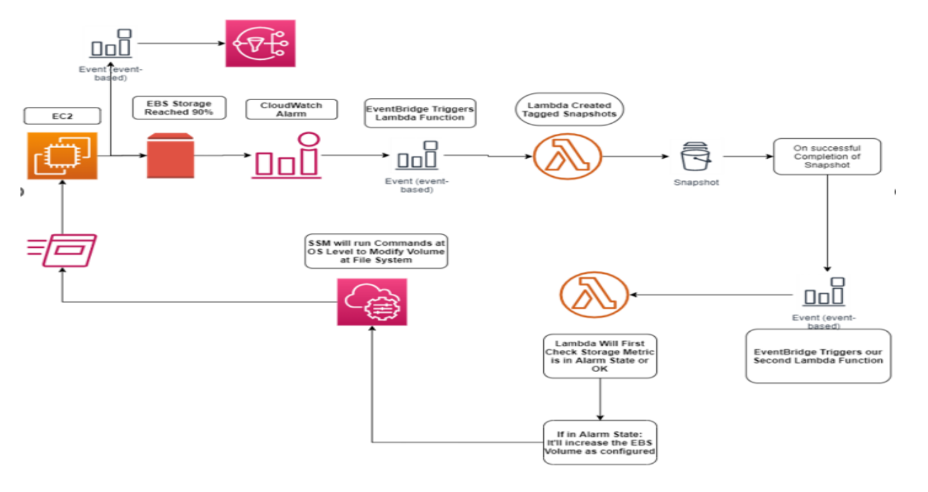We are living in a dynamic and technology-driven world where manual processing and tedious solutions have no place. They tend to increase cost, effort, and time. Modern needs and demands require resource optimization and process automation. With the advent of cloud computing things have become easier than before. Optimizing resources is more critical than ever for businesses to thrive. Enter Xavor’s storage automation design – a solution tailored to efficiently manage Amazon Web Services AWS Elastic Block Store (EBS) volumes. This innovative approach not only ensures optimal storage capacity but also drives substantial cost savings. It is easier on your pockets and decreases your effort and emotional labor.
Xavor’s storage automation design empowers businesses to take control of their AWS storage utilization with precision. By defining a custom threshold for EBS volume usage, like 90%, this solution operates autonomously, seamlessly increasing storage by a predetermined percentage when the usage approaches the threshold. This intelligent mechanism guarantees that businesses consistently have the necessary storage capacity, all while minimizing avoidable expenditures and manual intervention. It is a smart solution that guarantees and promises high durability in addition to high availability.
Simplified EBS Volume Extension through Automation
As businesses expand, their storage needs invariably grow. Manually extending Amazon Elastic Block Store (EBS) volumes can be time-consuming and disruptive. Enter Xavor’s automation solution, harnessing the power of AWS Lambda and EventBridge to automate EBS volume extension effortlessly, ensuring seamless scalability without operational hiccups.
Key Services Enabling Automated EBS Volume Management
To comprehend the orchestration of this automation process, it’s essential to understand the key AWS services in action.
- CloudWatch: This robust monitoring and alerting service is at the core of the automation process. It monitors various metrics, including storage metrics of EBS volumes, and triggers actions based on predefined thresholds.
- Lambda Function: As a serverless computing service, Lambda handles event-driven tasks seamlessly. It’s utilized to execute code based on CloudWatch events, enabling the automation workflow.
- EventBridge: This event-driven service plays a vital role in connecting different AWS services. It captures and routes events from various sources to their respective targets.
- System Automation (AWS Systems Manager): This service facilitates the automation of administrative and maintenance tasks across AWS resources, ensuring smooth operations.
- SNS (Simple Notification Service): SNS is responsible for sending notifications and alerts to subscribed stakeholders when specific events occur.
- IAM (Identity and Access Management): IAM ensures secure control over resources by defining permissions and access policies for different roles and users.
Essential EC2 Configuration
Two agents must be installed on the EC2 instance.
- CloudWatch Agent: This component tracks storage metrics and transfers them to CloudWatch for monitoring and analysis.
- SSM Agent: The Systems Manager Agent allows for secure remote command execution using SSM documents.
SSM Document for System-Level Volume Extension
The journey to automate EBS volume extension begins with crafting a meticulous AWS Systems Manager (SSM) document. This document acts as a blueprint for the subsequent stages, containing a precise sequence of commands that will be executed at the system level once the EBS volume size is increased. This will increase the size of the mount point.
Monitoring Mount Point Metrics with CloudWatch
The initial phase of the solution involves closely monitoring the storage metrics of Amazon Elastic Block Store (EBS) volumes on an EC2 instance. Here’s a breakdown of how this step works:
- Mount Point Metrics Collection: On the EC2 instance, you’ll need to install and configure the CloudWatch Agent. This agent collects various system and application metrics, including storage-related information, from the instance. The focus here is on the specific mount point associated with the EBS volume you want to monitor.
- Sending Metrics to CloudWatch: Once the CloudWatch Agent is set up, it continuously gathers metrics related to the designated mount point. These metrics include information about the amount of storage used and available on the EBS volume.
- Setting an Alert Threshold: Within AWS CloudWatch, you’ll create a CloudWatch alarm based on the collected metrics. For example, you can set an alert to trigger when the utilization of the EBS volume reaches 90%. This is the threshold at which you want the automated process to initiate.
- Defining Actions: When configuring the alarm, you’ll also specify the action that should be taken when the threshold is breached. This action will involve triggering an SNS alert and AWS EventBridge rule, which acts as a conduit for further steps in the automation process.
Lambda Functions at Pla
1. First Lambda Function
Generates a snapshot of the EBS volume currently in alarm state.
2. Second Lambda Function
- Validates if the mount point is still in alarm state.
- If in alarm, dynamically increases EBS volume size.
- Executes an SSM document for system-level mount point extension.
EventBridge Rules
Rule 1
Trigger: Activated when the mount point breaches the threshold and enters an alarm state.
Action: Triggers the First Lambda Function.
Result: Initiates snapshot creation for the alarmed EBS volume.
Rule 2
Trigger: Activated upon successful completion of the snapshot (from Rule 1).
Action: Triggers the Second Lambda Function.
Result: Checks alarm status, adjusts volume size and executes SSM document for system-level extension
Rule 3
Trigger: Activated after the specific EBS volume undergoes modification (from Rule 2).
Action: Send an email notification.
Result: Notifies stakeholders about the successful volume modification.
Workflow
An orchestrated workflow that eliminates manual intervention. It commences with CloudWatch’s vigilant monitoring, detecting EBS volume metrics breaching a set threshold. This triggers an autonomous sequence: the AWS Lambda Function generates a snapshot of the alarmed EBS volume, while the Second Lambda Function validates the threshold breach, dynamically expands the volume size, and initiates system-level modifications. EventBridge rules meticulously coordinate each step, ensuring a fluid progression. Upon successful volume extension, stakeholders receive notifications via SNS. This cohesive orchestration leverages automation to seamlessly enhance storage capacity, mitigate costs, and ensure uninterrupted operations, epitomizing the future of resource management.

So, now is the time to say goodbye to all process bottlenecks and issues. Usher into a new era of automation with Xavor’s automation solution.

